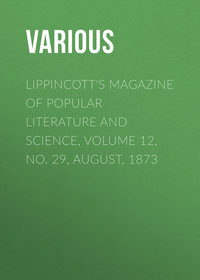Kitabı oku: «Lippincott's Magazine of Popular Literature and Science, Volume 12, No. 29, August, 1873», sayfa 13
Various
Bir şeyler ters gitti, lütfen daha sonra tekrar deneyin
Türler ve etiketler
Yaş sınırı:
0+Litres'teki yayın tarihi:
16 kasım 2018Hacim:
280 s. 1 illüstrasyonTelif hakkı:
Public Domain